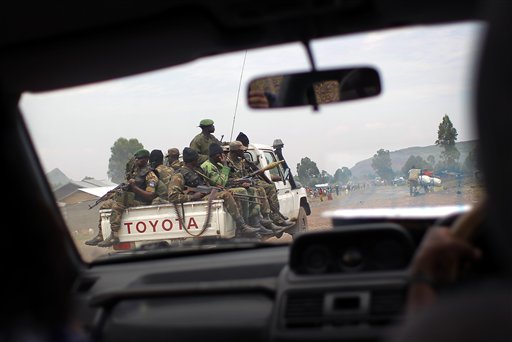 hotographed through a car windshield, Congolese FARDC (Forces Armees de la Republique Democratique du Congo) sit with their weapons on a pickup truck outside Goma, eastern Congo, Monday Aug. 13, 2012. Congo’s mineral-rich east has been wracked by fighting since April, when army deserters calling themselves the M23 Movement launched a rebellion to demand better pay, better armaments and amnesty from war crimes. The fighting, the worst in years, has forced some 280,000 people from their homes.(AP Photo/Jerome Delay)
hotographed through a car windshield, Congolese FARDC (Forces Armees de la Republique Democratique du Congo) sit with their weapons on a pickup truck outside Goma, eastern Congo, Monday Aug. 13, 2012. Congo’s mineral-rich east has been wracked by fighting since April, when army deserters calling themselves the M23 Movement launched a rebellion to demand better pay, better armaments and amnesty from war crimes. The fighting, the worst in years, has forced some 280,000 people from their homes.(AP Photo/Jerome Delay)
GOMA, Congo (AP) —The 25-year-old lay on a hospital bed in the Congolese city of Goma, his leg wrapped in a bandage tinted by the blood still seeping from his bullet wound.
He was shot during a fight between soldiers from the Congolese army and M23, the African nation’s newest rebel group. Like 21 others from his village, M23 rebels had kidnapped him and forced him to carry ammunitions in the battlefield.
“I was at home and I saw the rebels coming down the hill. They took us, we were 22 boys. When we pleaded to be let free they refused,” the young man told The Associated Press on condition of anonymity, fearing reprisals.
According to a report published Tuesday by Human Rights Watch, the newly-formed M23 rebel group is responsible for widespread war crimes in eastern Congo, including summary executions and rape. The report says the group has forcibly conscripted at least 137 youths and killed at least 33 young men and boys who tried to escape.
“The M23 rebels are committing a horrific trail of new atrocities in eastern Congo,” says Anneke Van Woudenberg, senior Africa researcher at the rights group.
“I was lucky,” said the 25-year-old, a schoolteacher who was left for dead by M23 after being shot but managed to reach a hospital with the help of villagers.
The new M23 rebellion began in April and May when the group’s senior commanders defected from the regular army. Their leaders include Gen. Bosco Ntaganda, who is wanted by the International Criminal Court for crimes against humanity committed during an earlier rebellion.
Ntaganda and other rebels claimed that Congo had not met its obligations under a 2009 peace deal, an agreement that allowed former fighters to join the regular army. Before that peace deal, the fighters were in the bush of eastern Congo fighting under the banner of the National Congress for the Defense of the People, a rebel group backed by neighboring Rwanda.
The current rebellion is only five months old, but already a U.N. report provides evidence of Rwanda’s military and logistical support. And Human Rights Watch, in a separate report published in June, documented that Rwanda had recruited up to 300 Rwandans who were made to travel across the border to fight on behalf of M23.
Rwanda has denied allegations that it supports M23 —and the leaders of M23 also reject the Human Rights Watch findings.
Reached by telephone on Tuesday, Col. Vianney Kazarama, the M23 spokesman, strongly denied the allegations.
“We invite everyone to come investigate on the ground and see the truth. These are false accusations and we regret that Human Rights Watch publishes false reports. Go to the health centers in Rutshuru, you’ll see there are no women raped by our men,” he said.
Besides the forced recruitment and the executions, Human Rights Watch found that M23 soldiers raped at least 46 women and girls, including one who was only eight years old.
Congo has been called “the rape capital of the world” because of the gruesome sexual torture that has been committed in eastern Congo, but the recent rapes documented by HRW stand out for their brutality.
The report quotes a 32-year-old woman who said that that M23 fighters attacked her family in the village of Chengerero on July 7.
“Before leaving, the M23 fighters gang-raped her, poured fuel between her legs and set the fuel on fire,” the report said.
Copyright 2012 The Associated Press.